Do you have trouble sticking to a daily routine? Would you like to start doing something every day, but can't figure out what? Do you need a tool that will help you achieve your goals? Are your New Year Resolutions stuck in the air and never meet the ground? If any of these questions are yes, then our Free Daily Planner Template is just the thing you need!
What is a Daily Planner?
A daily planner is a tool used to organize and manage your daily activities and tasks. It typically consists of a notebook or digital application with pre-designed templates or pages that allow you to break down your day into specific time slots, and allocate tasks and activities to those slots.
Daily planners usually have sections for prioritizing tasks, setting goals, noting down appointments, and scheduling events. They can help you manage your time effectively, improve productivity, and reduce stress by allowing you to plan and prioritize your daily activities.
Some daily planners may also include additional features such as habit trackers, gratitude journals, and sections for meal planning or exercise tracking. Overall, a daily planner is a useful tool for anyone who wants to stay organized, focused, and productive throughout the day.
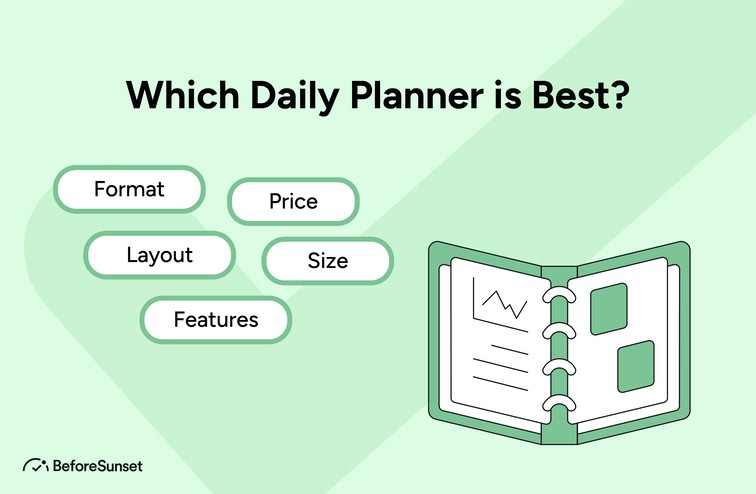
Which Daily Planner is Best?
The best daily planner for you depends on your personal preferences, needs, and lifestyle. Here are some factors to consider when choosing a daily planner:
Format: Daily planners come in a variety of formats, including paper-based, digital, or a combination of both. Consider which format you prefer based on your personal habits and preferences.
Size: Daily planners come in various sizes, from small pocket-sized versions to larger desk-sized options. Consider where and how you will be using your planner to determine which size is best for you.
Layout: Daily planners can have different layouts, such as hourly, daily, weekly, or monthly views. Consider which layout will work best for your needs and schedule.
Features: Some daily planners come with additional features like habit trackers, goal setting prompts, or inspirational quotes. Consider which features are important to you and will help you stay motivated and on track.
Price: Daily planners can range from affordable to quite expensive. Consider your budget and how much you are willing to spend on a planner.
Ultimately, the best daily planner for you is one that fits your needs and helps you stay organized and productive.
What is a Top 3 In Planner?
The following are the top 3 components any planner needs:
Space for Prioritization: An excellent planner should contain enough room for you to prioritize your objectives and activities. This can take the shape of a daily to-do list where you can rank the significance or urgency of your chores. This will enable you to concentrate on the activities that matter the most and make sure you meet all necessary deadlines.
Flexibility: A planner needs to be adaptable and flexible. Plans are subject to alter at any time since life is unpredictable. Whether it's via letting you transfer chores to a new day or time slot or by including room for comments and reminders, your planner should be able to handle these changes.
Motivational Elements: A planner must to incorporate elements that motivate and prod you to stick to your chores and goals. These may take the shape of motivational sayings, questions for creating goals, or habit monitors. You can maintain your motivation and prioritize your goals with the aid of such features.
Is There a Google Daily Planner?
Yes, Google Calendar has a daily planner. With Google Calendar, a digital calendar tool, you can create and manage events, appointments, and tasks. You may set up notifications and calendar reminders to help you stay to your plan.
By adding events and activities to your schedule, establishing alerts to keep you on track, and setting reminders, you can use Google Calendar as a daily planner. You may also select other viewpoints, such as daily or weekly, to get a comprehensive image of your calendar.
You can view your daily schedule from anywhere thanks to Google Calendar's ability to sync with all of your devices, including your desktop computer, tablet, and smartphone. Furthermore, sharing your schedule with them makes it easy to plan get-togethers with friends, family, or coworkers.
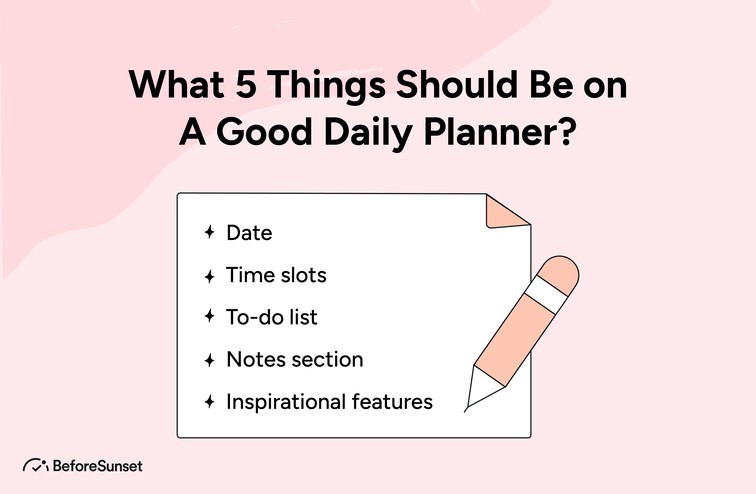
What 5 Things Should Be on A Good Daily Planner?
Making a daily planner is an important task for many people, but the real significance lies in how well you can use it. You need to make sure that your daily planner includes the 5 basic parts I mentioned in this section so it can help you effectively accomplish your goals.
Date
To keep track of the day, date, and other pertinent events or circumstances that may have an influence on your schedule or goals, a smart daily planner should feature a space for dates that is both simple and useful. In order to make it simple to determine the current date, the date section should include the day of the week and a numerical date, such as April 24, 2023.
It could also consist of occasions like birthdays for friends or national holidays that could affect your schedule. The current moon phase, such as full moon or new moon, may also be included in the date section for individuals who observe lunar cycles.
The forecast or current weather information may also be included in certain daily planners, which may be useful when deciding what to wear or when organizing outside activities. The information in a well-designed date section should be sufficient to help you stay organized and on track with your daily tasks and objectives.
Time slots
To assist you properly arranging your activities and duties, a decent daily planner should contain set time slots for each day. If you need to arrange your day in detail or have a lot of appointments, hourly or half-hourly time slots might be useful.
To make it easier for you to keep track of your schedule throughout the day, these time slots should be prominently marked and labeled. The time slots should also be adaptable enough to accommodate last-minute schedule modifications or delays.
You should be able to modify your calendar as needed and transfer other responsibilities to a different time slot, for instance, if a meeting lasts longer than anticipated. Overall, a well-thought-out time slot section ought to provide you just the right amount of structure to keep you on track while also providing for adaptation and flexibility in your daily routine.
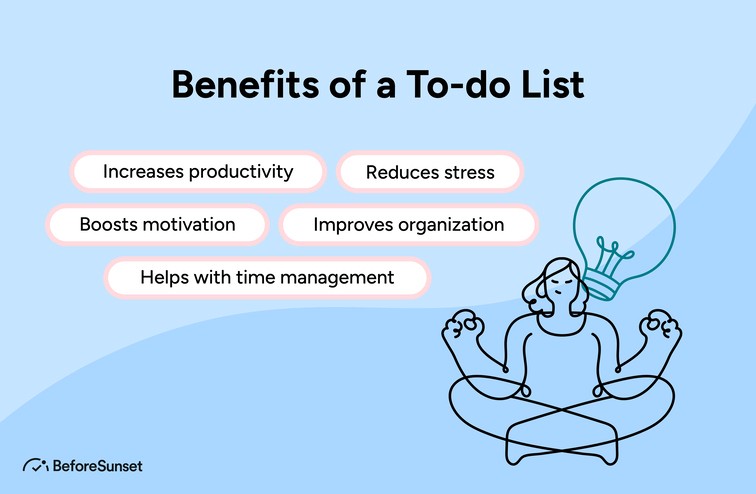
To-do list
A portion in a decent daily planner should be designated for making daily to-do lists. You should be able to organize your chores and activities into multiple categories, such as professional, personal, or health-related duties, in this area and then prioritize them.
With adequate room to put every job you need to do for the day, the to-do list area should be simple to use and clear. As you do each activity, it could also have checkboxes or other indicators to help you keep track of your progress.
Additionally, a decent daily planner could enable you to prioritize your duties by categorizing them as high- or low-priority based on their urgency or level of importance. In general, a well-designed to-do list section should assist you in maintaining concentration and compliance with your daily priorities and goals.
Notes section
An area for taking notes in a decent daily planner should be included so that you may record any pertinent facts, suggestions, or thoughts that occur to mind over the course of the day. There should be enough room in this part for you to write freely and imaginatively.
To assist you with maintaining orderly and readable notes, it could feature lines or grids. Meeting minutes, brainstorming sessions, or introspective musings should all be able to be included in a well-designed notes section.
To assist you in classifying or ordering your notes, it could also incorporate symbols or icons. Furthermore, some daily planners could have a space specifically designated for long-term or future planning where you can record thoughts or objectives that might not be pertinent to your daily agenda.
In order to stay focused and productive, a decent notes section should help you record and arrange your thoughts and ideas throughout the day.
Inspirational features
A excellent daily planner should include motivational elements to keep you inspired and goal-focused. These elements could consist of motivational sayings, affirmations, or pictures that encourage you to be upbeat and productive.
A daily planner could also have a section for reflection or appreciation where you can list items you're grateful for or consider your day's successes. A well-designed planner may also have prompts or activities, such goal-setting worksheets or habit trackers, that may help you define your priorities and goals.
You could find mindfulness or meditation activities in some daily plans, which will motivate you to take a break and practice self-care. Overall, a solid daily planner ought to give you the instruments and motivation you require to continue being inspired, motivated, and productive.
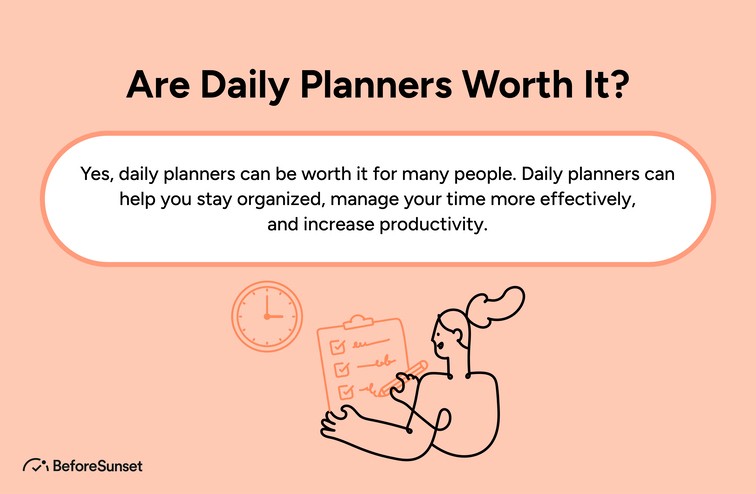
Are Daily Planners Worth It?
The value of a daily planner relies on the user and their own requirements and preferences. A daily planner may be a useful tool for people who have trouble staying organized or managing their time so they can be more productive. A well-designed planner may offer structure and regularity, assisting people in setting priorities and efficiently managing their time.
By enabling people to divide their work into smaller parts and schedule their days in advance, daily planners can also help people feel less stressed and be more productive. A planner may also be used as a record of successes, assisting people in monitoring their development and identifying areas that want work.
A daily planner, however, may not be beneficial or required for everyone. Some people might choose to utilize different techniques or a digital calendar to keep track of their schedules. In the end, it boils down to taste and choosing the strategy that works best for you.
Do People Still Use Paper Planners?
Yes, despite the development of digital tools and applications for organization and time management, individuals continue to use paper planners. Some people like the tactile sensation of writing things down by hand while others love the palpable, practical approach that paper planners provide for organizing tasks and activities.
Since users can choose who has access to their paper planner and don't have to worry about data breaches or internet security concerns, paper planners also provide consumers a sense of privacy and security.
Paper planners may also provide a respite from screen time, which is good for the eyes and the mind. Using a paper planner, for some individuals, enables them to unplug from technology and become more conscious and present.
While digital tools may have benefits like automated reminders and simple device synchronization, paper planners provide a distinctive and personalized experience that may be useful for many people. The choice between a paper planner and a digital tool ultimately boils down to personal preference and what works best for each person.
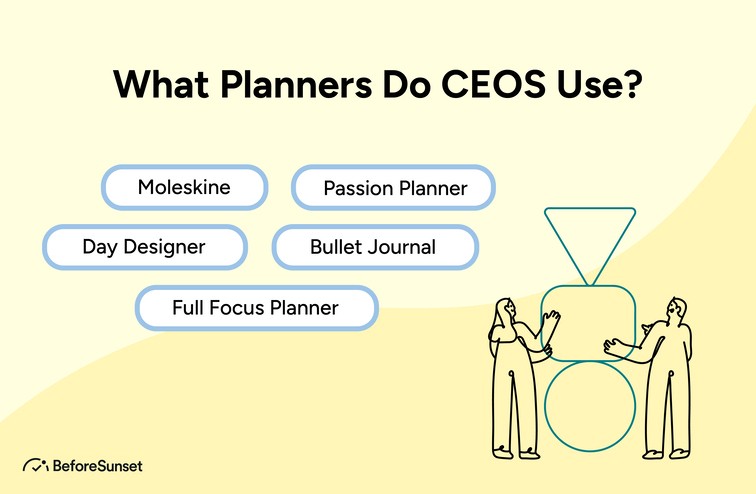
What Planners Do CEOS Use?
There is no universally applicable response to the topic of what planners CEOs employ because each CEO has unique tastes and needs. However, some common planners employed by CEOs are as follows:
Moleskine: This well-known notebook company provides a variety of planner alternatives, including as daily and weekly layouts.
Passion Planner: Passion Planner is a planner featuring a variety of features, including as weekly layouts, goal-setting worksheets, and reflection prompts, to help users create and fulfill their objectives.
Full Focus Planner: With features like daily task lists, goal-setting worksheets, weekly and quarterly evaluations, and more, the Full Focus Planner assists users in breaking down their objectives into doable tasks.
Bullet Journal: The bullet journal is a popular option for CEOs who want total freedom and control over their planning system since it is a customized planning method that enables users to construct their own layouts and pages.
Day Designer: Day Designer includes a selection of planner layouts, including daily and weekly ones, along with tools for goal-setting, to-do lists, and habit tracking.
The ideal planner for a CEO ultimately depends on their own tastes, needs, and objectives.
Does Planner Work for ADHD?
Yes, those who suffer from ADHD (Attention Deficit Hyperactivity Disorder) may find use for a planner. A planner might be helpful for those with ADHD who struggle with time management, organization, and recall.
A planner can assist people with ADHD by offering a planned routine and schedule, assisting in the division of work into smaller, more manageable steps, and offering prompts and reminders for crucial occasions and deadlines. A planner may also assist people with ADHD in setting priorities and managing their time well, which can lower stress and increase productivity.
It's crucial to remember that not all planners will be effective for those with ADHD. Finding the planner and method that is suitable for each person may need some trial and error. While some people with ADHD might find digital tools like apps or online planners more convenient, others might feel that a physical paper calendar is more practical. Finding the planner that best suits a person's requirements and tastes is crucial.
What Age Group Uses Planners The Most?
Depending on the planner's nature and the situation, different age groups utilize planners more frequently. However, historically, people in their 30s and 40s have used planners the most frequently. This is probably because people in this age range have greater obligations and expectations from their jobs and families.
However, there has been a rising trend among younger generations—particularly millennials and Gen Z—to use planners in recent years. This could be as a result of the growing focus on productivity, self-care, and mental health among this age as well as the popularity of social media influencers that advocate for planner use.
Additionally, planners are frequently used by students of all ages to aid in time management and organization, especially in high school and college when academics and extracurricular activities may be daunting. Younger kids might utilize activity or chore charts as planners to aid with daily chores and obligations.
Overall, it is evident that planners may be a useful tool for people of all ages to stay organized, manage their time efficiently, and minimize stress, even though the age group that utilizes them the most varies.
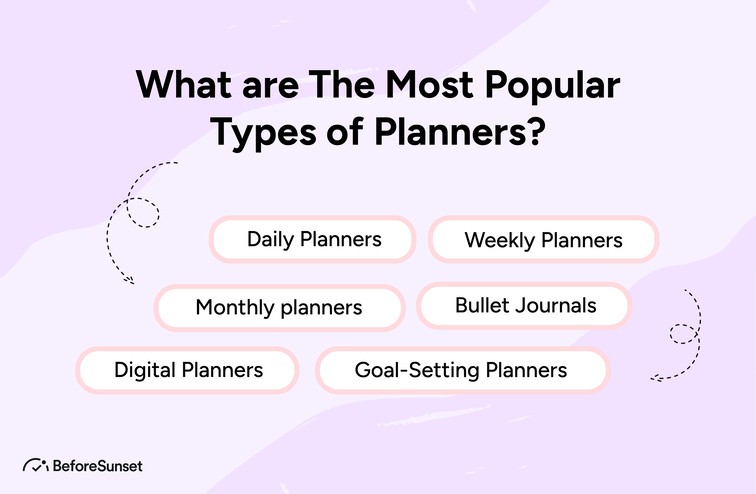
What are The Most Popular Types of Planners?
There are several sorts of planners accessible, and each form may be more or less popular based on the requirements and preferences of the user. But a few of the most well-liked kinds of planners are as follows:
Daily Planners: These calendars are made to be used every day. They normally have a page for every day, with room for appointments, to-do lists, and notes.
Weekly Planners: Weekly planners offer a more thorough breakdown of the week, with a two-page spread for every week that has room for appointments, to-do lists, and notes.
Monthly planners: Monthly planners offer a summary of the month and contain a page for each month with room for significant dates and occasions.
Goal-Setting Planners: With features like goal-setting worksheets, progress trackers, and reflection prompts, these planners are intended to assist users in creating and achieving their objectives.
Bullet Journals: Bullet journals are a popular option for people who desire total freedom and control over their planning system since they are a customizable planning method that lets users build their own layouts and pages.
Digital Planners: Digital planners provide the ease of digital tools, like as applications or online planners, for organization and productivity, and are growing in popularity, especially among younger generations.
The most often used kind of planner will ultimately rely on the individual's particular requirements and preferences, as well as their way of life and daily schedule.
How Do Beginners Use Planners?
Although utilizing a planner may seem overwhelming at first, it can be an effective tool for productivity and organization with a few simple steps. Begin with a basic planner in an easy-to-understand layout.
Determine if a daily, weekly, or monthly planner is ideal for you. Make a list of your objectives and set targets, such as improved time management, tracking your behaviors, or decreasing your stress levels, after you have your planner.
The next stage is to make using your planner a habit by allotting a certain amount of time each day for task and schedule preparation and revision. Make frequent use of your planner, and don't be afraid to make changes as you learn what works best for you. Finally, use your calendar to help you stay motivated and focused on your goals.
You'll feel more productive if you keep your schedule organized and on track.
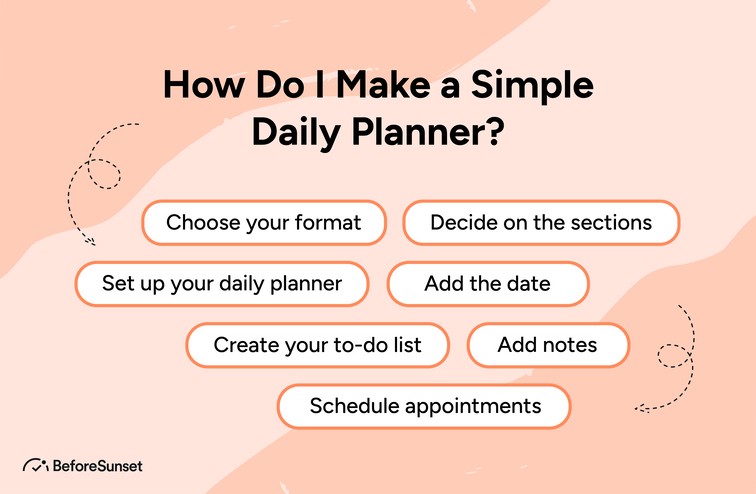
How Do I Make a Simple Daily Planner?
An excellent strategy to keep focused on your daily duties and activities is to create a basic daily calendar. The first step in making your own daily planner is to select a template that meets your requirements.
You may make your own templates using a spreadsheet or word processing program, or you can locate free printable templates online. Create sections in your planner based on your daily schedule and priorities after you have your design.
Sections for appointments, to-do lists, notes, and whatever other information you wish to monitor might be included in this. To help you efficiently organize your day, make sure your planner has time slots. Depending on your requirements, you may divide your day into half-hour or hourly halves.
Last but not least, utilize your planner often to remain on top of your responsibilities and schedule. Don't hesitate to make modifications as you discover what works best for you.
How Do I Make a Successful Daily Schedule?
Being productive, organized, and successful all start with having a great daily routine. The first step in creating a productive daily plan is to decide which of your chores and obligations are the most crucial.
These should be the factors that determine your success on both a personal and professional level. Schedule your most critical jobs first, when you have the greatest energy and attention, when you have determined your priorities. Make sure to provide deadlines for each activity and divide your projects into doable, smaller segments.
Take into account your daily natural energy levels while planning your routine. You might want to put off less crucial duties until later in the day when you have less energy. Finally, plan your time realistically and factor in breaks and rest to rejuvenate.
Remember that a productive daily plan should be fluid and adaptive, allowing for unforeseen circumstances and shifting priorities. You may make a daily routine using these methods that will increase your productivity and success.
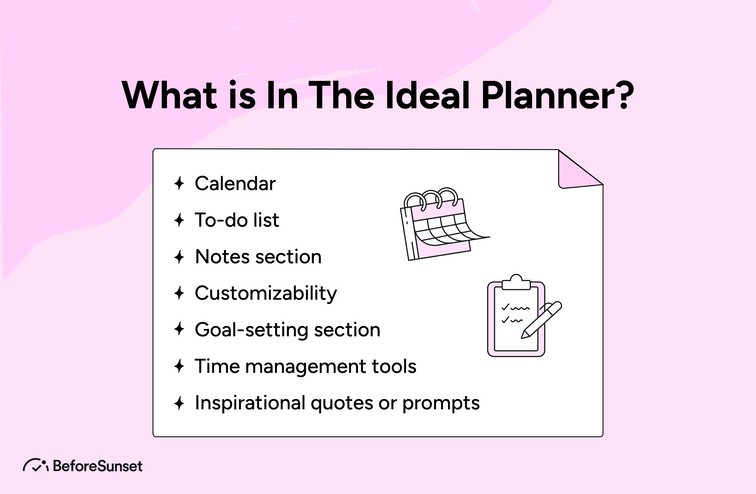
What is In The Ideal Planner?
The perfect planner should contain functions that meet your specific demands and aid in maintaining your level of organization and productivity. An excellent planner should, at its heart, feature a date area where you may record your appointments, meetings, and other events.
In order to properly plan your day and manage your time, it should also include time slots. The perfect planner should also have a place for a to-do list because this will allow you to prioritize your duties and keep on track with your objectives.
For ideas, reminders, or significant information that doesn't fit elsewhere, a notes section might be helpful. Sections for recording routines, objectives, and funds can be included in certain planners. The best planners will ultimately be practical, simple to use, and adaptable to changes in your priorities and schedule.
Download Our Free Daily Planner
To sum up, a daily planner is a useful tool for anyone who wants to remain focused, organized, and productive all day. By helping you to organize and prioritize your daily tasks, it enables you to efficiently manage your time, increase productivity, and decrease stress.
To pick a daily planner that suits your demands and aids in your organization, take into account aspects like format, size, layout, features, and pricing. A good daily planner should have sections for setting priorities, being flexible, and having inspirational components.
To assist you with organizing your activities and responsibilities, it should also have a date section and time slots. A digital daily planner, Google Calendar syncs across all of your devices and can be used to create and manage events, appointments, and tasks.
In the end, a daily planner is an important tool for assisting you in achieving your objectives and regaining control of your life. Therefore you should download our free daily planner.



